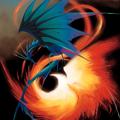crochetedman apžvelgė autoriaus Isaac Asimov knygą Foundation
Review of 'Foundation' on 'Storygraph'
5 žvaigždutės
The Foundation series are some of my favorite books. They're definitely a product of their time (Asimov was clearly more comfortable with writing short stories for magazines than with writing novels, and his biases are obvious in the misogynistic treatment of the few women in the story) but their basic ideas hold up well.
I personally really enjoy the rather dry political tone, and both the lack of focus on character development and the long time-skips are fitting given the premise of the story (which posits a theory of "psychohistory" in which the overall trajectory of a large group is emphasized over the actions of individuals, and which can be used to predict and direct the future over long periods of time). The plot twists and reveals also never come out of nowhere, and sufficiently tie back to previous details to make each individual part feel neat and tidy.
The Foundation series are some of my favorite books. They're definitely a product of their time (Asimov was clearly more comfortable with writing short stories for magazines than with writing novels, and his biases are obvious in the misogynistic treatment of the few women in the story) but their basic ideas hold up well.
I personally really enjoy the rather dry political tone, and both the lack of focus on character development and the long time-skips are fitting given the premise of the story (which posits a theory of "psychohistory" in which the overall trajectory of a large group is emphasized over the actions of individuals, and which can be used to predict and direct the future over long periods of time). The plot twists and reveals also never come out of nowhere, and sufficiently tie back to previous details to make each individual part feel neat and tidy.









